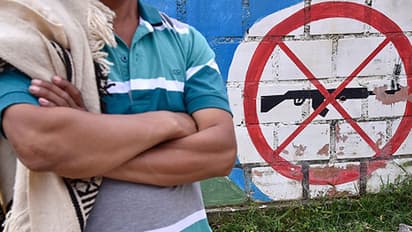'Peace Deals': From Colombia to Nagaland, crime replaces law

Synopsis
This week the end seems near for one of the world’s longest running conflicts Colombia and FARC. This story has eerie similarities with another conflict in India that has been going on an even longer time; the Naga armed movement. While ‘peace deals’ claim their successes by controlling killings, they do not necessarily ensure justice or return to governance.
Garcia Marquez described the story of his book News of a Kidnapping as "the biblical holocaust that has been consuming Colombia for more than twenty years."
It is a journalist chronicling real-life characters, absurd events, and relentless terror, with a fairly dramatic ending.
Controlling the events is a man we never meet until the very end - the brutal and elusive Pablo Escobar, the head of the Medellin cartel.
Over the last couple of weeks, Escobar is back in the news because of Netflix announcing the release of Narcos Season 2, a series that the company claims in the most watched show on earth.
Pablo Escobar is the only criminal ever to have designed his own prison in Honey Valley, south-east of Medellin after he struck an agreement with Colombian authorities.
This gave him protection from other gangs hunting for him and saved him US extradition. Unofficially the prison was called Hotel Escobar that included a soccer field, a discotheque, a doll house and a bar.
He even chose his own guards. It had a waterfall, cellular phones, radio transmitters. At his peak, his cartel earned $60 million a day and controlled 80% of the cocaine smuggled to the United States.
A coincidence of sorts that this week the end seems near for one of the world’s longest running conflicts after the announcement of a ‘peace deal’ between the government of Colombia and the Revolutionary Armed Forces of Colombia (known by the Spanish acronym FARC) that had turned to drug trade making millions from trafficking cocaine.
Following the success of the Cuban revolution in 1964, these rebels wanted to forcibly redistribute wealth leading to a five-decade-long devastating war hijacking passenger planes, seizing territory, attacking government forces , abducting and killing people.
An estimated 220,000 died in the insurgency and as many as 5 million people were displaced; that is like one out of every 10 Colombians.
There have been attempts at brokering peace in the mid-eighties but it ended in 1990.
Another attempt was made in 2002 but that ended with ceding a large territory to the FARC. Since 2012 efforts were again underway presided by Cuban President Rual Castro till this June a breakthrough was arrived and President Juan Mantos and the FARC leaders signed a full ‘peace deal’.
The challenge now is to ensure that the FARC is disbanded fully and they surrender their guerrilla strongholds.
They have already expressed their willingness to join the political track and starting a party. Reconciliation, however, will be the key.
This story has eerie similarities with another conflict in India that has been going on an even longer time; the Naga armed movement, which went through the same peace, deals, splits, killings, abductions and drug trade.
In 2015 the government of India announced the final peace agreement with the dominant faction NSCN(IM) and vowed to disband them and reintegrate them to the mainstream.
However, after 80 rounds of talks between the government of India and Naga group since the ceasefire in 1997 the ‘peace deal’ that was signed lacks any clarity.
The ‘framework agreement’ is yet to spell out what the ‘deal’ incorporates. Meanwhile, the armed group NSCN(IM) has not given up arms or the camps or their illegal means of ‘taxation’ that includes extortion from vehicles, people and government schemes.
They continue running the narcotics empire and arms running. The other armed group NSCN(K) operating from Myanmar that abrogated the ceasefire has struck a few times on Indian security forces and flourishes on underworld trade.
So while ‘peace deals’ claim their successes by controlling killings, they do not necessarily ensure justice for the victims or return to governance.
Instead, a nexus of insidious crime replaces the rule of law.
Stay updated with the Breaking News Today and Latest News from across India and around the world. Get real-time updates, in-depth analysis, and comprehensive coverage of India News, World News, Indian Defence News, Kerala News, and Karnataka News. From politics to current affairs, follow every major story as it unfolds. Get real-time updates from IMD on major cities weather forecasts, including Rain alerts, Cyclone warnings, and temperature trends. Download the Asianet News Official App from the Android Play Store and iPhone App Store for accurate and timely news updates anytime, anywhere.